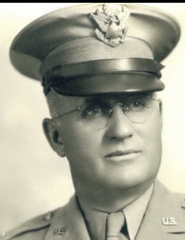Shells Explode Near Frank Miles and Companions
By Frank Miles
In the Field with the First Army (IDPA) -- Army vehicles: tanks, destroyers, caissons carrying artillery guns, armored amphibious trucks loaded with soldiers, ammunition, other equipment and food, ambulances, jeeps and motorcycles, were pouring in a long stream on a sticky road in a drizzling rain toward a bridge over the Rhine river in Germany.
Capt. Karl Bromel, Detroit, Mich., of first army public relations, and I were in a jeep. The driver and I were in the front seats, the captain in the rear.
The captain and I were talking when, 200 yards from the bridge end, the whistle and crunch of a nazi shell too close to us changed our situation.
The driver swung the machine to the right, slammed on the brakes and leaped to the ground.
I seized the beaver board mud shield at my right to clear the way for the captain and me. It stuck.
"Get out, Frank!" said the captain simultaneously giving me a push that landed us both in the dirt.
We bounced up running, reached the side of a brick wall, then realized we were in the open jerry positions, tore around a corner of the building and crouched down with other uniformed men behind a truck.
Just as we reached there another shell blasted a third of the roof off a house 25 feet away. A moment after the debris ceased falling, we straightened up to hear what a young officer was saying.
"Guess my helmet saved me," he half smiled. "Look."
A piece of steel had clipped a silver dollar-sized chunk from the rim of the head protector over his right eye, where there was a slight cut. The lid was bruised and there was blood on his nose.
We climbed back into the jeep and moved forward, where we were caught in a terrific traffic jam.
"I can see no reason for you going farther," said Captain Bromel, who had often been under fire in his 31 months overseas. "The jerries are bracketing places in the area and to shoot into the jam would be like shooting fish in a barrel."
"Let's turn around," I rejoined.
We did.
The enemy threw shells only once in there but over a wide range on the American-held side all day an din the evening his planes bombed the bridge from the air.
Source: Mount Pleasant News, April 10, 1945
![]()

